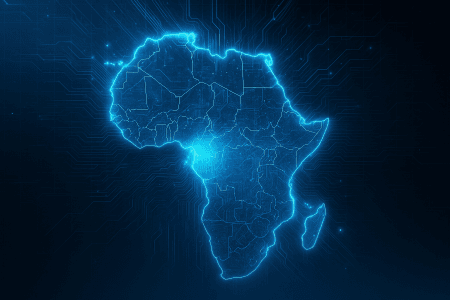The race to dominate artificial intelligence is underway. The U.S. and China are pouring billions into AI research and infrastructure. But while headlines focus on geopolitical supremacy, AI is no longer a distant concept, it is already reshaping how we work, learn, and tackle society’s most pressing challenges. The real question isn’t who builds AI fastest; it’s who builds it for everyone, and who leads this transformation responsibly and inclusively.
Nowhere is this urgency more pressing than in Africa. Despite being home to the world’s youngest population, and the fastest growing labor force, the continent receives only a fraction of global AI investment. With over 60% of its population under the age of 25, Africa is not just the world’s youngest continent, it is the world’s future workforce, creative engine, and moral compass. Yet, when it comes to global AI strategy, Africa is often overlooked, this is more than a moral oversight.
Africa is uniquely poised to shape the AI-driven future—if its vast talent and resources are activated. Yet barriers remain: limited access to advanced training, outdated education systems, and restricted global networks threaten to leave the continent on the sidelines of this global revolution. If AI is shaping everything from education to employment to ethics, and with African youth projected to make up 40% of the global youth population by 2025, building inclusive AI ecosystems here is one of the most important equity investments of our time.

This is not just Africa’s challenge, it is the world’s opportunity. When African talent leads in AI innovation, everyone benefits. From healthcare breakthroughs to financial inclusion, climate solutions to entrepreneurship, Africa’s next generation can solve problems at a scale unmatched anywhere else.
ALX: Empowering Africa’s Youth to Lead in the Global AI Era
AI is not neutral. It reflects the values and contexts of its creators. If the tools of the future are being built without African voices, data, or design principles, then the solutions of tomorrow will be incomplete, inequitable, and even harmful.
Africa stands at a pivotal moment, with its youthful population offering unprecedented potential to drive the AI revolution. Harnessing this talent through access and opportunities will not only empower young Africans to participate actively in this era but to lead with purpose, shaping a future defined by innovation, sustainability, and bold African leadership.
At ALX, learning goes beyond technical training, it is nation-building infrastructure for the digital age. Our dynamic ecosystem is helping to cultivate a generation of AI-literate, entrepreneurially-minded, and socially-conscious African leaders and innovators. Through a unique community model combining peer support, world-class mentors, and an ever-expanding network of professionals and alumni, young people gain the confidence, resilience, and connections needed to thrive, and to lead solutions that will shape Africa’s AI-driven future.

“AI is the new power. Every young person, every enterprise, every society must learn to harness it, because it will shape the opportunities, economies, and futures of tomorrow,” says Fred Swaniker, Founder & CEO of ALX.
ALX programmes are designed for impact and relevance, leveraging AI tools, machine learning, and data analytics to accelerate learning. Our learners gain the technical, strategic, and leadership skills to adapt in a rapidly evolving global economy. Beyond training, access to networks, career opportunities, and entrepreneurial pathways ensures that ALX alumni are empowered to design solutions, create ventures, and lead boldly, shaping the AI-driven future Africa deserves.
Innovation and Impact in Action
Africa is already showing that it can lead in AI innovation. A great example of how AI is shaping solutions with tangible impact across the continent is the Rwanda Health Intelligence Centre, launched this year by the Ministry of Health, Republic of Rwanda and, powered by Sand Technologies. This innovative platform, which provides real-time data to anticipate disease trends, improve healthcare outcomes, and guide policy, is a striking example of how AI is creating a better future, in this case one where data-driven insights lead to healthier outcomes for all.

At this year’s United Nations (UN) AI for Good Summit, held in Geneva in July 2025, Africa’s innovators demonstrated solutions that transform lives in low-connectivity environments, from maternal health tools to fintech platforms. {For deeper insights on Africa’s impact at the summit, click here to read a reflective article by Jaco Jansen van Rensburg, Vice President, Corporate Training at ALX}
Indeed, Africa’s potential to lead in this AI moment is truly unprecedented and inspiring, and at ALX we are honored to be powering an ecosystem of young, bold African innovators and leaders ready to shape the continent’s AI-driven future. From healthcare to fintech, ALX alumni are leading ventures that are redefining what’s possible for communities across the continent and globally. Algorithmic bias and global AI challenges aren’t solved through panels or discussions—they are addressed by funding and empowering the African data scientists, engineers, and entrepreneurs who are closest to the problems and the solutions.
Tangible Transformation in Action
Since launch, ALX has empowered 300,000+ young Africans, and evidence-based data shows that more than a quarter have already stepped into jobs, freelance roles, or launched ventures that are reshaping industries and uplifting communities. Today, over 43,000 learners remain actively engaged in the ALX ecosystem, including nearly 20,000 women — a powerful signal of how ALX is not just building scale, but nurturing stories of transformation that are already taking shape across Africa.
One such story is Branice Otiende , an ALX venture alum who is using AI to unlock accessibility for 30M+ Deaf Africans through her startup, Signvrse, an AI-powered real-time sign language interpretation platform already partnering with UNICEF and UNFPA to build the largest African sign language motion dataset. In Egypt, Samar Elghalban is addressing learning poverty with Edulga, a regenerative AI-powered knowledge platform connecting educators, learners, and institutions worldwide to make quality education universally accessible. And in South Africa, Nkosiphambili (Edward) Molapisii is driving inclusion in the creative economy with Sync Discovery, empowering artists to protect and monetize their music globally.
These ventures exemplify the transformative potential of AI in Africa. According to a Mastercard report, the African AI market is projected to grow from $4.5 billion in 2025 to $16.5 billion by 2030, highlighting the significant economic opportunities AI presents across the continent. These are not Silicon Valley copycats. These are locally rooted, globally ambitious solutions to problems that affect millions.
Why Everyone Should Care
AI is not just for engineers or tech companies. It matters to every young person, every business, and every society. Yet despite Africa’s enormous potential, most global AI investment remains concentrated in a handful of cities and institutions in the Global North. Africa’s absence from this landscape is not just a result of limited infrastructure or capital; it stems from a failure to imagine a different future.
A future where African data is used ethically and locally. A future where AI doesn’t just optimize systems but rewrites who those systems serve. A future where the most diverse continent on Earth becomes the testing ground for the most inclusive technologies the world has ever seen.
Investing in African talent, infrastructure, and innovation is not a feel-good cause. It is a generational opportunity to shape the trajectory of global technology in ways that are more just, more representative, and more resilient.
- For young Africans: AI opens doors to high-impact careers, global opportunities, and entrepreneurial ventures.
- For companies: Upskilling teams in AI ensures competitiveness in the global economy.
- For societies: Building inclusive AI ecosystems ensures innovation benefits everyone, not just a select few.
Crucially, the future of work must also be built by everyone, for everyone. Inclusion in technology is central to ALX’s mission. Women, historically underrepresented in tech, now make up over 40% of ALX learners, well above the global average of 28%. Through intentional outreach, strong community networks, and access to transformative opportunities, more young women and underrepresented groups are stepping up to lead in shaping the AI-driven workforce.
This isn’t just about diversity. It’s about reimagining who gets to innovate, lead, and thrive in a rapidly evolving, AI-powered world. By creating space for all voices, ALX is building a technology workforce that is both equitable and powerful.
The Future Is Being Written Now
The story of the future of work is unfolding in real time, and ALX’s agile, scalable, and impact-driven approach is helping to shape it. The most consequential decisions about the future of work, education, health, and civic life will be mediated by AI. If we want those decisions to reflect the needs and aspirations of all humanity, then we must pay attention to where and how the next generation of AI leaders is being trained. Every program launched, every learner trained, and every venture sparked brings Africa closer to a workforce that is AI-ready, innovation-driven, and positioned to lead on the world stage.
Now is the moment to act with urgency. Young Africans, companies, and policymakers alike must seize this opportunity to unlock the continent’s vast talent. The AI generation we choose to be is one where opportunity is shared, innovation is purposeful, and Africa leads not just in ideas, but in impact that resonates globally. Together, we can ensure that this generation doesn’t wait for the future, it builds it.
The question is whether global actors are ready to see that as a strategy, not a side note.
To learn more about how to join ALX as a learner—or to be part of a collaborative movement supporting and investing in Africa’s talent—visit www.alxafrica.com. If you happen to be near one of our hubs, stop by to experience firsthand how we are shaping the leaders and innovators of tomorrow.






